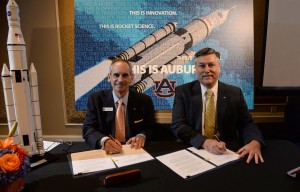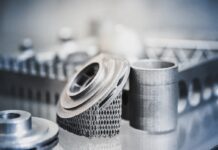Auburn University has inked a Space Act Agreement with NASA to explore and advance the applications of additive manufacturing.

Image credit: Auburn University
The agreement – signed by Dr John Mason, Auburn’s Vice President for research and economic development and Patrick Scheuermann, Director of NASA’s Marshall Space Flight Centre – is also set to allow students to engage in NASA’s missions and opportunities, investigate and develop technologies and share facilities and technical expertise.
The Marshall Centre has used 3D printing, or additive manufacturing, to build and test rocket engine components and manufacture the first 3D printed parts aboard the International Space Station. These parts are currently being tested at the Centre.
NASA has stated that it is expanding its 3D printing capacities with an eye on direct 3D printing in space. The act was signed during Auburn’s forum, “Additive Manufacturing, the Next Industrial Revolution.” The keynote speech at the forum was given by Greg Morris, General Manager of Additive Technologies with GE Aviation in Cincinnati. GE Aviation is bringing high-volume additive manufacturing to its facility in the city of Auburn to manufacture jet engine fuel nozzles.
Aside from NASA, the agreement will also create more internship opportunities with GE Aviation.
“Additive manufacturing is a major advancement for the future direction for the nation’s industries. The partnership with NASA is an excellent opportunity to engage and leverage each other’s capabilities and expertise,” said Mr Mason,
“As we continue developing the agency’s powerful new rocket, the Space Launch System, for deep-space missions to an asteroid and a journey to Mars, additive manufacturing techniques are making it possible to create and test innovative new designs quickly and affordably. Marshall is also pioneering the use of 3-D printers in space, and the recycling and sustainability of advanced manufacturing materials needed to enable long-term missions. We’re pleased to partner with industry and academia as we focus on technologies that not only are central to the nation’s space mission but also benefit aerospace and other activities on Earth,” said Mr Scheuermann.
According to Mr Mason, the deal has great potential to boost Auburn University’s position in the field of manufacturing sciences.
“We are establishing partnerships with highly innovative businesses and organisations to spur economic growth throughout the state and region,” Mr Mason added.
“These relationships benefit our students with learning experiences, while companies benefit from the practical, applied solutions developed through research conducted by faculty and students.”



















